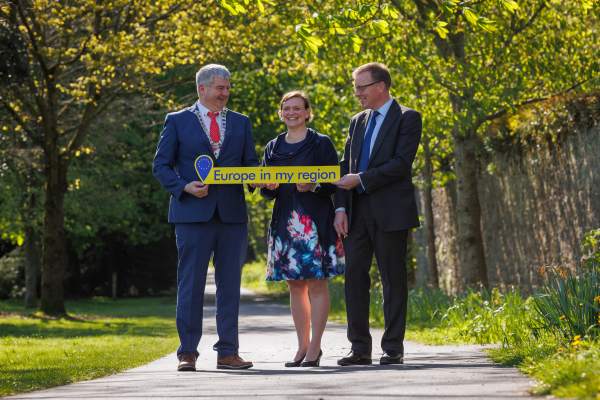Over €663 million is to be invested in the Southern Region and the Eastern and Midland Region over the next seven years to help create quality jobs, transition to low carbon and support higher education, enterprises, public bodies and local authorities in delivering balanced regional development.
The Southern, Eastern & Midland Regional Programme 2021-27 launched today, (Tuesday, April 25, 2023) is co-financed through the European Regional Development Fund, (ERDF), by the European Union and the Government of Ireland and managed by the Southern Regional Assembly. ERDF aims to strengthen economic, social and territorial cohesion in the EU by correcting the imbalances between its regions.
This Programme invests in activities that will build research, development & innovation capacity, assist homeowners in or at risk of energy poverty and contribute to the revitalisation of our regions’ towns centres through sustainable urban development.
The Progamme Area has a population of 3.8 million and covers just over half of the country.
Limerick, Clare, Cork, Kerry, Waterford, Carlow, Tipperary, Wexford, Kilkenny, Kildare, Meath, Wicklow, Louth, Westmeath, Laois, Offaly, Longford as well as Dublin are targeted as part of the Programme, which is aligned with the Irish Government’s aim of promoting balanced regional development through the Regional Economic and Spatial Strategies for the two regions of the Programme Area.
David Kelly, Southern Regional Assembly Director, said the Assembly is delighted to lead the roll out of the Programme as Managing Authority. “This Programme will have a direct impact on balancing regional disparities in Ireland by targeting support at regional level for research and innovation, energy efficiency and sustainable regeneration of our regional towns.
“Over the past half-century, Ireland’s EU membership has changed how we live, work, study and travel for the better. This new chapter in the story of ERDF in Ireland will continue to improve our way of life in the Irish regions by addressing key regional challenges,” Mr Kelly said.
The Programme will target its funding supports through three priority areas. Priority 1 is the creation of Smarter and more Competitive Regions by enhancing research and innovation capacity and supporting regional enterprise. It has a total budget of €337 million. Supports will be delivered through six streamlined schemes in the Programme Area. Six of the country’s universities and two Institutes of Technology are in the targeted Programme Area, and it is also home to four newly-established Technological Universities. Investing in collaborative research and innovation activities will build capacity within and between the institutions and collectively support the regional innovation ecosystem and knowledge economy.
These schemes will be rolled out by Programme delivery partners which include Science Foundation Ireland, Enterprise Ireland and the Higher Education Authority.
Priority 2 is the creation of Low Carbon, Energy Efficient Regions and has a budget of €199 million. This will be achieved by supporting investments to improve energy efficiency of residential homes, targeting homeowners in or at risk of energy poverty.
Responding to the energy challenges, the Programme will fund deep retrofitting to ease the burden of homeowners in or at risk of experiencing energy poverty, reducing the amount they are spending on energy consumption and reducing their carbon emissions. These deep retrofits will be delivered by the Sustainable Energy Authority of Ireland, SEAI.
Priority 3 is Sustainable & Integrated Urban Development. It involves taking an integrated strategic approach to the regeneration of our towns using a Town Centres First Framework.
Aligning closely with the objectives of the Regional Spatial and Economic Strategies for the Southern Region and the Eastern & Midland Region, the Programme supports the regeneration of regional town centres as the vibrant heart of local communities to live, work and visit.
A budget of €90 million has been set aside for this work which will be rolled out by the Southern Regional Assembly through the local authorities in the Programme Area.
Jim Conway, Eastern and Midland Regional Assembly Director, said: “Both regions in this Programme Area have strong opportunities and diverse challenges. While they both have a strong urban feature, they also each have a rural and smaller regional focus and we have many opportunities and challenges that can be addressed together. This Programme will support targeted investments which will make a real difference to quality jobs and inclusive growth by breathing new life into our regional towns and villages.”
Cllr. Oliver Walsh, Cathaoirleach of Southern Regional Assembly said they will work in partnership to deliver for the regions. “It is clear that this investment into the two regions of the Programme Area will build capacity within and between them to directly address the need to balance regional disparity.
I look forward to watching the different support schemes progress over the coming years in this new chapter of ERDF to continue to improve our way of life at regional level.”
Schemes in the Southern, Eastern and Midland Regional Programme are due to be launched throughout 2023.
Schemes under Priority 1 will be the first to launch, and aim to build research, development and innovation capacity in the public research institutions of the Programme Area, by:
- Establishing two regional smart hubs to accelerate research, training, innovation, commercialisation, collaboration and synchronisation with industry;
- Developing technology transfer specialists to help with commercialisation opportunities;
- Developing and delivering immersive needs-led innovation training programmes;
- Providing appropriate infrastructure and key staff resources to deliver innovative solutions, support programmes and an impetus for entrepreneurship, start-ups and scaling companies and
- Enhancing capacity of the new Technology Universities in the Programme Area to drive and support regional research, capacity building & innovation.

